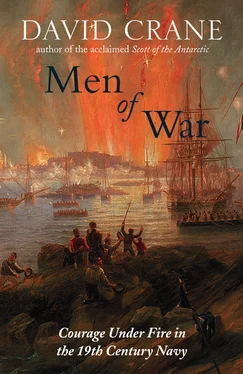As Greece slid inexorably into chaos, with Colocotrones in the Morea and Odysseus Androutses, the most formidable and devious of the klephts, in mainland Roumeli, rampantly out of control, the next twelve months were as bleakly pointless as any in Hastings’s life. After five fruitless days at the Mills he had decided that he could be better employed on Hydra, but within the week he was again back on land, crossing and recrossing the Morea in a restless search for a leader who might impose some structure on the enveloping turmoil. ‘I was glad to find that Colocotroni’ – the ‘hero’ of Tripolis and the Dervenakia – ‘was disposed to make a beginning towards introducing a little regularity,’ he wrote on 5 October, in Tripolis in time to witness the town en fête for the grotesque anniversary celebrations of the horrors of 1821, ‘& I find that having been Major of the Greek corps in the English service [in the Ionian Isles], he is able to appreciate the advantages resulting from regular discipline … After mass we visited him, he appeared extremely acute & intelligent & perhaps (not withstanding the character which the Govt give him) is better able to govern than they are – the abuse heaped upon him by the Hydriots evidently arises from jealousy of his influence & success.’
For a good English Whig Hastings was perhaps becoming more tolerant of despotism and ‘strong government’ than was good for him, but then again a journey through the parched and devastated Morea in the autumn of 1822 was not going to provide a lesson in the virtues of constitutional government. After leaving Tripolis and Colocotrones he made his way south-west to Navarino and Messina, filling his journal as he went with anything and everything from the number of trees in Arcadia (28,000) to the sight of a Kalamata beggar – amputated feet in hands as he crawled through the marketplace – or the latest example of Greek perfidy. ‘The Turks had obtained terms of capitulation,’ he recorded of the surrender of Navarino’s Turkish garrison,
by which it was stipulated that the lives of the garrison should be spared, that they should be permitted to carry away 1/ 3of their property & be transferred to Asia on board Neutral Vessels – But no sooner had the Greeks taken possession of the Fortress than they massacred the greatest number of the inhabitants & transported the rest to a rock in the harbour where they were starved to death … It is confidently asserted that the bishop issued his malediction on those Greeks who failed to massacre the Turks.
The remarkable thing about all this is not how like every other embittered philhellene Hastings sounds in his journal, but how unlike them he acted. For most of his fellow travellers the shock of disillusionment was rapidly terminal, but it only took the slightest sniff of action or the sight of a fortress still in Turkish hands to bring Hastings back to the colours, as enthusiastic as ever.
If he had foreseen the role Navarino would play in the revolution, he might have paid it even more attention than he did, but it was above all Nauplia’s Palamidi that exercised his mind. On his return from his travels he had gone back to his old base on Hydra, and on 9 November he was joined there by another shadowy foreign volunteer called d’André, who had sought him out with a proposition that between them they should equip and lead a party of a hundred Greeks to storm the Palamidi.
For all his doubts about d’André, it was a proposition that left Hastings feeling not ‘a little ébloui’ – dazzled – and that same day he purchased fifty muskets at forty-eight piastres each and embarked with his new colleague for the Gulf of Argos. At the Mills d’André wrote to a dubious species of military ‘pimp’ in the business of troop procurement, and by the next day Hastings had his company to command – or at least forty-five of the fifty soldiers he had been promised, which was all that a ‘certain Mr Testat’ could produce at such notice. ‘I armed them,’ he recorded, with an optimism that he could still, bafflingly, bring to his military dealings with the Greeks, ‘causing to be read to them at the same time some articles by which they were informed of the conditions upon which I delivered them the arms.’
Although the government at Tripolis was prepared to grant Hastings a commission that cost them nothing, they were not ready to feed his men, and while d’André headed with their company for the Dervenakia, Hastings returned to Hydra for more funds. ‘I visited the Minister of War,’ he wrote indignantly on 30 November, ‘who did not receive me too well considering the expense I had been at – he seems to consider the arming of 50 men as something not worth the trouble of undertaking & urged me to form a corps of 300 – I replied I would undertake it if he would furnish me with the money – as to the money he said I could easily raise that sum.’
In one respect, at least, the Minister was right, because for all the good Greece or Hastings would get out of his investment he might have saved himself the bother. The next day he set off to the north to rejoin his troops, who were guarding the passes near Corinth, and found Testat in a state of permanent drunkenness, his second-in-command little better, and his unfed soldiers – ‘one & all’ – in such a state of mutinous discontent that only Hastings’s arrival came between d’André and their bayonets.
The real problem, as ever with Greek irregulars, was not fear of the Turks but the lure of plunder, and with rumours of the fall of Nauplia reaching them with every messenger Hastings had no hope of keeping them at their post. He managed to buy himself some time by dismissing d’André, but when news at last reached them that the Palamidi had surrendered without a shot being fired, there was nothing he could do but join in the general migration south and look for a chance to regain his muskets. ‘I made the soldiers pile their arms,’ he wrote on 20 December, grateful that he did not have ‘to resort to firing measures’ against his own men, ‘& then applied to Colocotroni who sent an officer who brought the arms & placed them in the room where Colocotroni held his council … The measure was quite unexpected by the soldiers & surprised them so completely that they did not even murmur.’
The absurd and the horrific were never far apart from each other in this conflict, however, and Hastings was determined to get out of Nauplia before the town fell to an expectant and mutinous army. Through the last weeks of the siege the garrison had been too weak even to climb up to the fortress, and as the Greek soldiers massed at the gates, determined to beat their own captains to the plunder, the Muslim sick and dying could only await their fate, eking out their final hours in the hopeless search among the unburied corpses of their dead children for a last, filthy scrap of food.
There is no doubt either – in spite of all the promises of safe-passage – that there would have been a repetition of Tripolis, Navarino, Athens and Monemvassia had not a British frigate, HMS Cambrian under the command of Captain Gawen Hamilton, sailed the next day into the Gulf of Nauplia. In these early years of the war there was a strong anti-English feeling in the Greek government, but even the most rabid anglophobe knew that in Hamilton they had a friend they could trust and an arbiter they could not ignore.
It is difficult, in fact, to believe that anyone else in the Aegean would have had the moral authority to impose his will in the way that Hamilton did at the surrender of Nauplia. ‘He held a conference with Kolokotrones and the Moreot chieftains,’ Finlay wrote,
whose Russian prejudices induced them to view the interference of an English officer with great jealousy. He was obliged to tell them in strong language, that if, on this occasion they failed to take effectual measures for the honourable execution of the capitulation, they would render the Greek name despicable in civilized Europe, and perhaps ruin the cause of Greece. The chiefs respected Hamilton’s character; the wild soldiers admired his martial bearing and the frankness with which he spoke the whole truth. He took advantage of the feeling he had created in his favour to act with energy. He insisted on the Greek government immediately chartering vessels to embark the Turks, and to facilitate their departure he took five hundred on board the Cambrian .
Читать дальше











